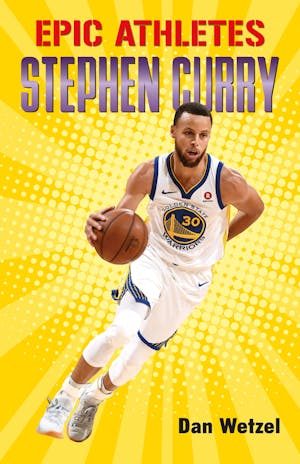1
Underdog
TWENTY THOUSAND CLEVELAND CAVALIERS fans stood inside Quicken Loans Arena and tried to distract Stephen Curry. They stomped their feet. They waved their arms. They cupped their hands up to their faces and screamed.
It was Game 6 of the 2015 NBA Finals, and Cleveland’s J. R. Smith had just drained a three-pointer. A Golden State lead that only minutes before had stretched to thirteen points was now just four, 101–97. There were 29.0 seconds remaining, still enough time for the Cavaliers to mount a comeback. Golden State led the series 3–2 and was trying to win the franchise’s first NBA title in forty years. The Warriors wanted to end the series right then, in this game, and avoid having to play a decisive Game 7. They didn’t want to give Cleveland superstar LeBron James another chance to win it all.
Cleveland had all the momentum. It was up to Curry to stop it, win the game, and grab the championship that he had spent a lifetime dreaming about.
Golden State had won sixty-seven games in the regular season, among the most by any team in NBA history. Behind Curry and teammate Klay Thompson, dubbed the “Splash Brothers” for the way so many of their long three-pointers splashed through the net, the team had cruised to The Finals with a 12–3 record. It was expected to beat Cleveland handily, especially after one of the Cavs’ stars, Kyrie Irving, was lost to injury.
Instead, LeBron raised his level of play and Cleveland took two of the first three games. To make matters worse, Steph, the best player in the league that season, was in a slump. His usually reliable shot was off. At the end of the Game 2 loss, he shot just two of fifteen from three-point range. He even tossed up an air ball, missing the rim altogether. “Shots I normally make … I knew as soon as they left my hand that they were off,” Steph explained. “That doesn’t usually happen.”
In the media, there was talk that Steph wasn’t tough enough for the big games and the pressure of the NBA Finals was getting to him. He had shaken that off and returned to form in Games 4, 5, and now Game 6. The Warriors clawed back and took the lead in the series. They couldn’t imagine it all coming undone in the last minute.
Everything rested on the slim shoulders of Steph Curry, who had been fouled and awarded two free throws. If he missed one or both of the shots from the line, Cleveland still had a chance. If he hit them, Golden State was almost assuredly going to win.
With the pressure mounting and the noise of all those Cavaliers fans raining down on him, Steph walked to the free-throw line. For years he had dreamed of and practiced for this moment. His entire life he’d been told over and over the same thing by coaches, scouts, and the media—that he would never be good enough to be a great college star or NBA player, let alone the MVP of the entire league.
Too small, they said. Too short, they claimed. Too little, they argued.
Curry now stood six foot three and weighed 190 pounds. That was small by NBA standards. LeBron, for instance, checked in at six-eight and 265 pounds of muscle. Curry had always been undersized, though, and he adapted his game around that fact. He was sometimes the smallest kid on the court in middle school. As a high school sophomore, he said he was “a little scrawny kid, like maybe five foot six, five foot seven and 120 pounds.” So he learned to shoot the ball with a high arc to avoid the outstretched arms of taller kids who would try to block his shot. By using quick dribbles and his speed, he found ways to create space on the court to get the ball up in the air and away from bigger players attempting to steal it from him.
He also knew that if there was one place on a basketball court where his height and weight didn’t matter, it was the free-throw line. No one is allowed to guard you there. No one can stop you from hitting every shot you take. The free-throw line doesn’t care who you are. It’s just you, the ball, and the rim, fifteen feet away, ten feet in the air. In a sport with so much movement, it is the one time everything is the same, from grade school basketball to here in the NBA Finals. It’s the one time the game stands still—but the pressure is still impossible to ignore.
Steph couldn’t count the hours he’d spent perfecting his routine and shot from the line. He was never going to be a great dunker. He was never going to be able to muscle over opponents and score easily. He understood his strengths and didn’t complain about his weaknesses. He knew he had to take points where he could get them. Besides, if bigger players were going to test his toughness and foul him, if they were going to attempt to bully him, the best revenge was to make both free throws. Eventually they’d stop or lose the game.
It started back in the driveway of his family’s home in Charlotte, North Carolina. It continued through his days at Charlotte Christian School and then Davidson College, the small school that believed in his potential. It remained a daily habit across his first six years in the NBA, when many wondered if he’d ever become a star.
No matter how good Curry got, he never stopped working on the basics, and that meant free throws. The key to hitting free throws is using the exact same approach and technique on every shot, even before you release the ball. It was a lesson his father, Dell, taught him at an early age. If you are dedicated to your training, then you always have something to lean back on.
Dell would know. He spent sixteen seasons in the NBA. He was a great player, which was another criticism Steph heard growing up: He wasn’t as good as his dad. Comparing a kid to an NBA player was unfair. How could a seventh grader, a high schooler, even a college player be as good as an NBA player? If Dell Curry weren’t his father, no one would have compared Steph to an NBA star. He’d just be Steph. Yet that’s what so many did. Steph heard it his entire life but never felt resentment toward his father. He loved him and loved the support he provided. These free throws were for Dell, too. Through all his years in the NBA, Dell was never on a championship team. This would be a title for the entire Curry family.
Steph knew that in these tense moments he needed concentration, repetition, balance, and follow-through. He was the best free-throw shooter in the league, hitting 91.4 percent of his attempts during the season. So even here, on the verge of attempting the most tense and dramatic free throws of his life, nothing changed. He went with what he knew best.
He stepped to the line and stared directly at the rim. He ignored the screaming fans, the waving arms, and the nervous teammates on the bench, who were silently praying that he’d make it. He took a deep breath and then exhaled to calm his nerves. He chomped on his mouth guard, which was hanging halfway out of his mouth, a habit he’d picked up through the years that now felt natural. “It calms me down,” he explained. He took one dribble and then smoothly shot.
Swish.
The Cleveland fans groaned before again ratcheting up the noise and commotion. Maybe, they thought, they could rattle him and make him miss the second shot.
Curry reacted like no one was in the arena. He was just a kid all alone back in his driveway rather than one shot away from icing the NBA championship. He casually slapped hands with a few of his teammates and then stepped back into the routine.
Deep breath, exhale, chomp the mouth guard, one bounce, perfect form.
Swish!
Moments later the game and championship were won, Golden State 105–97. Steph congratulated James on a series well played, dribbled out the clock, and pointed up to the sky. He then jumped up and down and hugged his teammates.
“I’m just so happy, man,” Curry said. “God is great.”
Text copyright © 2019 by Dan Wetzel.
Illustrations copyright © 2019 by Zeke Peña.






